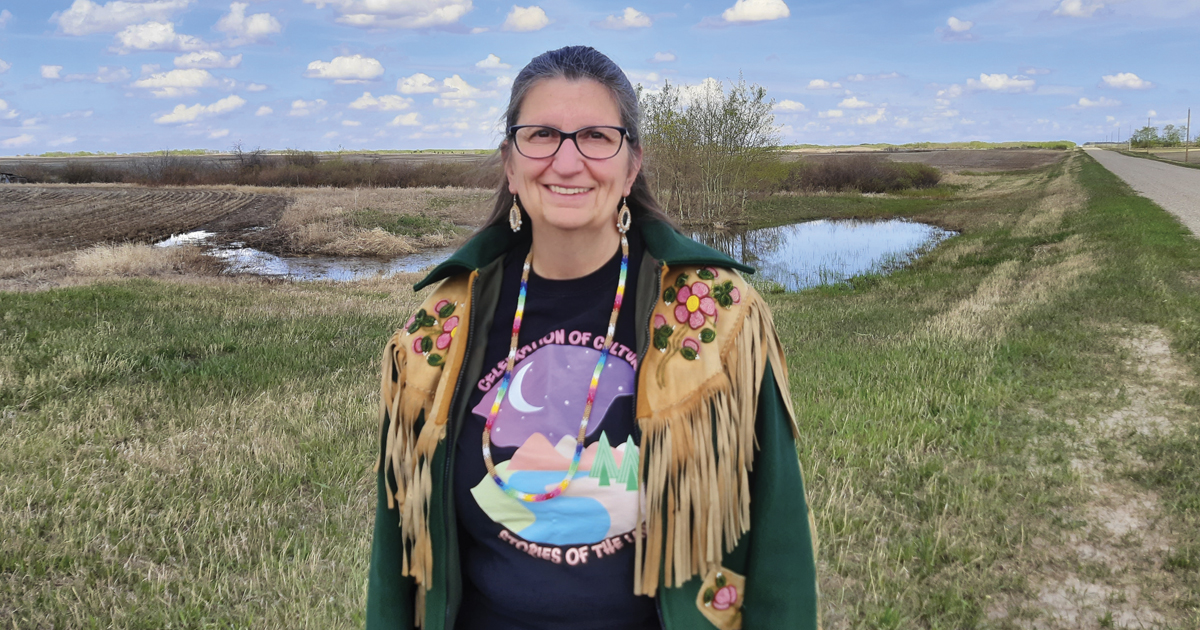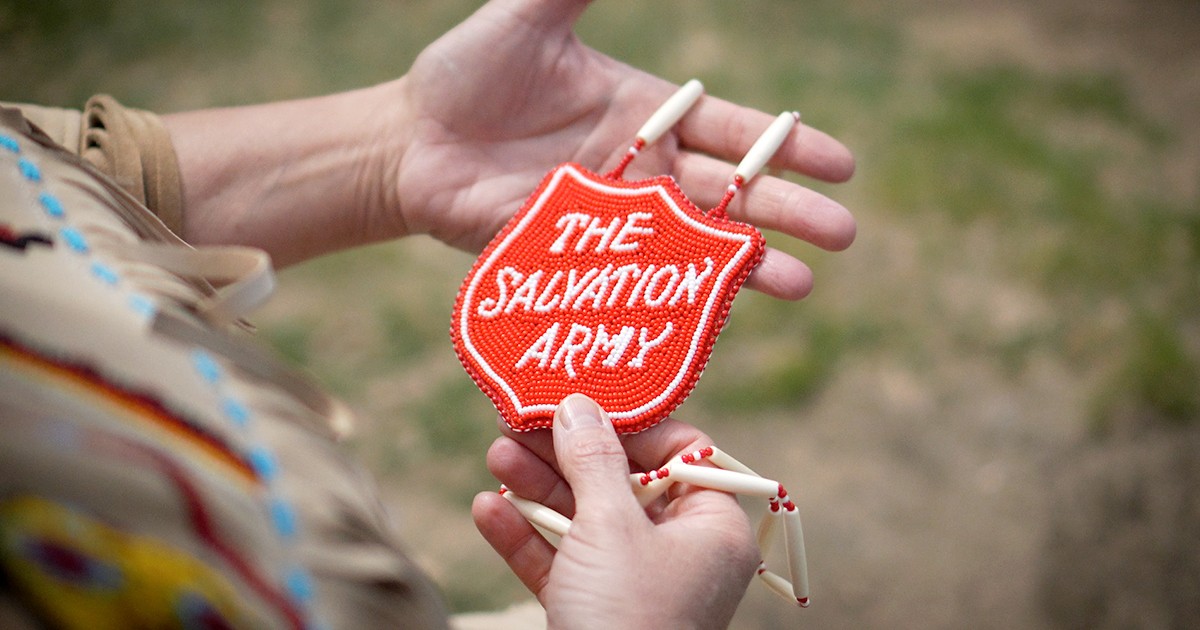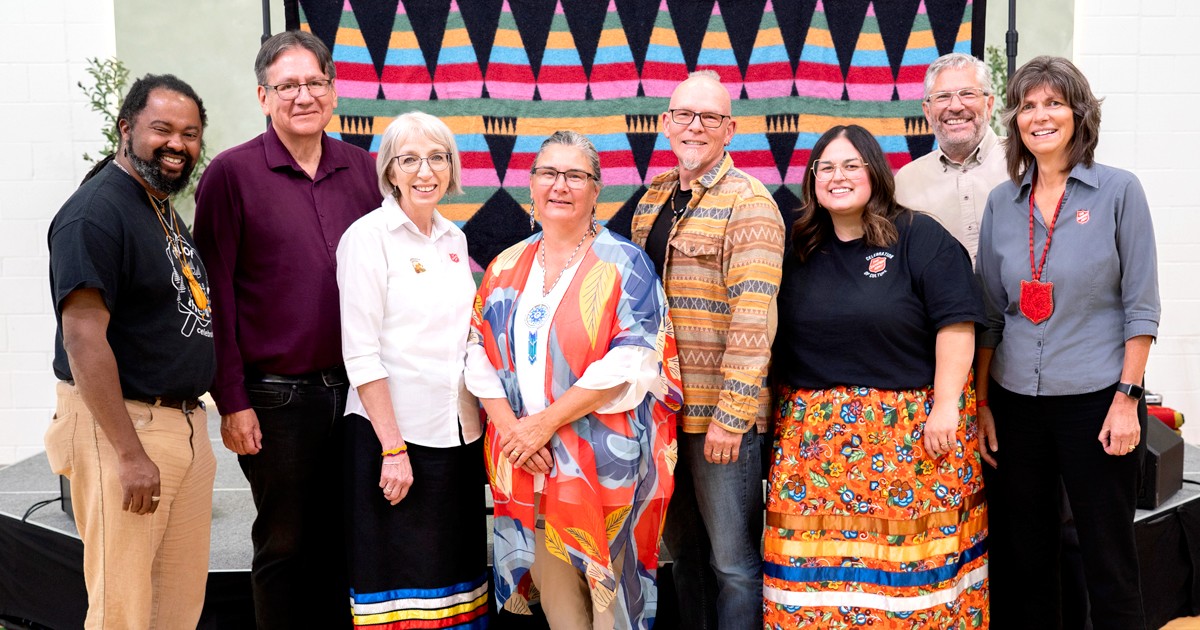(Above) Mjr Karen Hoeft on land that was taken from the Piapot Reserve and gifted to her grandfather as a soldier settlement plot after the First World War by the Government of Canada (Photo: Mjr Al Hoeft)
Today I greet you from the land of living skies and vast prairie plains, a land where the buffalo once roamed free and fed the people who lived here for thousands of years. I live, work and play on the traditional lands of the nêhiyawak, Nakawe, Dakota, Lakota and Nakoda, and the homeland of the Métis/Michif Nation. My ancestors were invited to this land by the Government of Canada at a time when the Indigenous nations were starved, lied to, cheated out of their land and moved to what the government called “reserves,” but could be considered concentration camps. This place is on Treaty 4 territory and is now known as Regina, Saskatchewan.
What are land acknowledgments? Why are they important? I believe they are very important, as long as they are heartfelt and don’t become rote. The paragraph above is the land acknowledgment I wrote after learning more of my own history and how it intersected with the history of the land and the people who called this place home before me.
In Scripture, almost every story is set in the context of a people group and their relationship to the land. As part of my studies, I have researched the theology of land and of exile. I love the words of Leviticus 26:42, where God says: “I will remember the land.” I believe that our stories are held in the lands where we are born, where our ancestors have lived and where history is recorded.
However, as settler communities in the land we now call Canada, we have often focused on our own history and have forgotten—or deliberately ignored— the history of the people and the land before our ancestors arrived. This is what makes land acknowledgments important in our time. We need to remember the history of the land and the people groups who have called this place “home” before us. We need to remember how we came to this land.
If we came in a bad way, then we must not gloss over but understand it, so that we can do better. Leviticus 26:40- 42 reads, “But if they own up to their sins and acknowledge the sins of their ancestors, if they admit that they have been unfaithful to me, defied me, and rebelled against me … if they humble their uncircumcised hearts and offer reparations for their sins, then I will remember my covenant with Jacob, Isaac, and Abraham, and I will also remember the land” (VOICE).
Land acknowledgments are a starting point for the work of reconciliation that needs to happen in our country. However, a land acknowledgment without action is just empty words. To write a personal land acknowledgment, I needed to understand that the history I had been taught was flawed. In searching out the story of early settlers in Saskatchewan, such as my great-grandparents, I read a book that recorded first-hand accounts of that time. I was astounded to find a common thread: they were all written as if no one else had ever lived on this land, as if it was “unclaimed,” empty and needing to be filled and used. These homesteaders believed they were coming to make this land better. This image was passed on to the next generations, and I am one of them.
In Healing Haunted Histories: A Settler Discipleship of Decolonization, Elaine Enns and Ched Myers write that we need to recover from “multiple settler disorders.” These are: “socio-historical ignorance (what we’ve been socialized not to know); cultural illiteracy (what we’ve been socialized not to learn); emotional disassociation (what we’ve been socialized not to care about); and credulity (what we’ve been socialized to believe).”
Too often, I hear people say, “I didn’t know” or “Why wasn’t I taught that in school?” We need to be intentional about taking the time to learn the true stories of the land and the people who have lived on this land for generations.
Learning the history and the story of the people who once lived where you now reside is a good way to start to understand what actions need to happen for us to find healing and reconciliation for future generations.
If you do not know where to begin, visit native-land.ca to find out more about the territories, languages and treaties in your area. Contact the local nations and learn some of their history before settlers arrived. Take some time and write out a land acknowledgment of the area you now live on. And join us at the Celebration of Culture at Pine Lake Camp, Alta., August 26-28, to learn more.
Major Karen Hoeft is the executive director of Waterston Ministries in Regina.
This story is from:










Comment
On Monday, August 15, 2022, Christine LeBlanc said:
On Wednesday, August 10, 2022, Collier and Lorna Azak said:
Thank you Major Karen for the excellent article on Land Acknowledgements. We are currently on a camping holiday near where one of our sons and his wife live in the Okanagan and there is a chance that we may be able to drive to Pine Lake near the end of the month to visit with you and Al. Bless you for the article.
On Monday, July 18, 2022, Rick Zelinsky said:
On Friday, July 15, 2022, Shayne Stanton said:
Having known both Major Karen and Al for a number of years now, and as a member of the Metis nation spoken about, I think that Karen and Al did a fine job in this story and I too think that it is important to acknowledge the ancestral home of my people who were so badly mistreated, it is a way to honor all those who came before me.
Leave a Comment